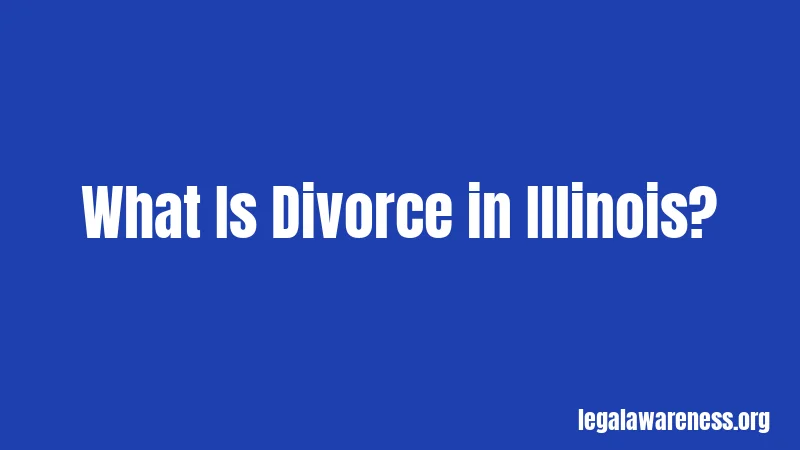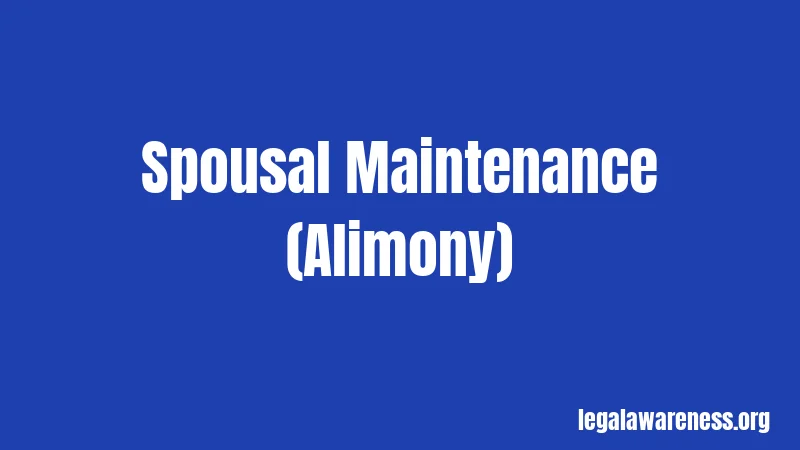Divorce Laws in Illinois (2026): Essential Rules Explained
Getting divorced in Illinois might seem overwhelming. But honestly? Once you understand the basics, it’s actually pretty straightforward. Let me break down everything you need to know about Illinois divorce laws in 2026.
Things have changed a lot recently. Major updates took effect January 1, 2025. Some of these changes are big deals. Trust me, you’ll want to know about them.
What Is Divorce in Illinois?

In Illinois, divorce is officially called “dissolution of marriage.” People use both terms. They mean the same thing. It’s the legal way to end your marriage.
Illinois is a no-fault divorce state. This is huge. You don’t need to prove anyone did anything wrong. No accusations of cheating or abuse required. The only reason you need? Irreconcilable differences.
What does that mean? Basically, your marriage is broken beyond repair. You’ve tried to fix it, or fixing it just isn’t realistic. That’s it.
Basic Requirements to File
Okay, here’s what you need before you can even start.
Residency Rules
You need to live in Illinois for at least 90 days. That’s the magic number. One spouse needs to hit this mark. Not both, just one.
Here’s the deal. You can file your paperwork before the 90 days are up. But the judge can’t finalize your divorce until someone meets that requirement.
Military folks get a special rule. If you’re stationed in Illinois for 90 days, you can file. You don’t need to be an official resident.
Where to File
File in the county where you or your spouse lives. Pretty simple. If you want to file somewhere else, you’ll need court permission. You’d file a motion explaining why.
Cook County is different. If you live there, you need to file in one of six district courthouses. Your address determines which one. A lawyer can tell you exactly where to go.
The Separation Period
Illinois has a separation requirement. You and your spouse need to live “separate and apart” for at least six months.
Wait, does that mean different houses? Not necessarily. You can live under the same roof. But you need to be living separate lives. Separate bedrooms. No physical intimacy. Basically roommates who don’t get along.
Sound complicated? It’s actually not. The court just wants proof you’re not together anymore.
Recent Law Changes in 2025

Hold on, this part is important. Several big changes took effect in January 2025.
Maintenance During Incarceration
This one’s major. Before 2025, if someone paying spousal support went to jail, their payments paused. No accumulation of debt while locked up.
That changed. Now payments keep piling up during incarceration. Any unpaid amounts become arrears. The person has to pay it all when they get out.
Can they avoid this? Maybe. They can petition the court for a modification. But it’s not automatic anymore.
Child Support Changes
Courts now have stricter rules about imputing income. That’s when the court assigns earning potential to unemployed or underemployed parents.
Judges must hold an evidentiary hearing first. They need to make written findings. No more quick decisions on potential income.
What if someone has no work history? The court presumes their potential income is 75% of Federal Poverty Guidelines. That’s the baseline.
Distance Calculations for Relocation
This affects parents who want to move. Distance is now measured using internet mapping services. The shortest route counts.
“As the crow flies” measurements? Gone. You can’t use that argument anymore.
Parenting Time Presumption
For the first time, Illinois law includes a presumption. Both parents should get at least 35% parenting time. That’s the starting point.
Courts can deviate from this. But they need evidence. This marks a shift toward more equal parenting.
Property Division
Illinois follows equitable distribution. Notice I said equitable, not equal. Big difference.
Equitable means fair. It doesn’t always mean 50/50. The court looks at what’s fair based on your situation.
Marital vs. Non-Marital Property
Marital property includes most stuff acquired during marriage. Houses. Cars. Bank accounts. Retirement funds. Even debt.
Whose name is on the title? Doesn’t matter. If you got it during the marriage, it’s probably marital property.
Non-marital property is different. This includes things you owned before marriage. Inheritances. Gifts given specifically to you. These usually stay yours.
Can non-marital property become marital? Yep. It’s called commingling. If you mix inherited money into a joint account, you might lose your sole claim to it.
What the Court Considers
The court looks at several factors. Each spouse’s income and property. The length of your marriage. Contributions each person made, including non-financial ones.
Your health matters. Your age matters. Future earning potential matters. The standard of living during marriage matters.
Here’s something new for 2025. Courts now put more weight on non-financial contributions. Stay-at-home parents, take note.
New Financial Disclosure Requirements
As of 2025, both parties must submit standardized financial disclosure forms. You have 30 days after filing.
These forms are detailed. They include specific valuation methods for businesses. Retirement accounts. Intellectual property.
Why the change? Transparency. The goal is fairer property division.
Debt Division
Debt acquired during marriage belongs to both of you. Even if only one person racked it up.
The court splits debt fairly, not necessarily equally. They consider who created the debt. Who can better afford to pay it. Other factors.
Warning. Even if the court assigns debt to your ex, creditors can still come after you. A divorce decree doesn’t change your obligations to banks. If your ex doesn’t pay, your credit score suffers too.
Want protection? Consider refinancing debts in one person’s name. Or paying them off before the divorce finalizes.
Spousal Maintenance (Alimony)

Illinois calls it maintenance. Other states call it alimony. Same thing.
Not everyone gets maintenance. The court decides if it’s appropriate based on specific factors.
Who Gets It?
The court considers income and property of each spouse. The needs of each person. Standard of living during marriage.
Physical and emotional health matter. Age matters. Earning capacity matters.
Did one spouse give up career opportunities? To raise kids or support the family? That’s a big factor.
How Much?
For couples with combined income under $600,000, there’s a formula. Take 33.3% of the payer’s monthly net income. Subtract 25% of the receiver’s monthly net income. That’s your monthly payment.
But wait. The total can’t exceed 37.5% of combined net income. That’s the cap as of 2025.
Notice something? These calculations use net income, not gross. That changed in 2019.
How Long?
Payment duration depends on marriage length. Longer marriages mean longer payments.
Married less than 5 years? Multiply the years by 0.20. That’s how many years you pay.
Married 5-10 years? Multiply by 0.40.
Married 10-15 years? Multiply by 0.60.
Married 15-20 years? Multiply by 0.80.
Married 20+ years? Courts can order permanent maintenance. Or maintenance for the length of the marriage. Judge’s discretion.
When Does It End?
Maintenance stops automatically in three situations. Death of either party. Remarriage of the recipient. Or if the recipient cohabits with someone on a conjugal basis.
What does conjugal basis mean? Living together like you’re married. Sharing finances. That kind of thing.
Can maintenance be modified? Yes. But you need to show substantial change in circumstances. Job loss. Health issues. Those count.
Parental Responsibilities and Parenting Time
Illinois doesn’t use the terms “custody” or “visitation” anymore. They changed the language in 2016.
Now it’s “parental responsibilities” and “parenting time.” Less adversarial. More cooperative.
Decision-Making Responsibilities
This is what used to be called legal custody. Who makes important decisions about the kids?
Four main areas exist. Education. Healthcare. Extracurricular activities. Religion.
Parents can split these. One parent handles education decisions. The other handles healthcare. You get the idea.
Or you can share all decisions jointly. Both parents agree on everything. This requires good communication.
Parenting Time
This is what used to be called physical custody or visitation.
The court decides based on the child’s best interests. That’s the standard. Always.
What does best interests mean? The court looks at many things. The child’s wishes, if they’re old enough. Each parent’s ability to cooperate. The child’s adjustment to home and school.
Relationships with parents and siblings matter. Distance between parents’ homes matters. Any history of abuse or neglect matters a lot.
The 35% Presumption
New for 2025. Courts now presume each parent should get at least 35% parenting time.
This isn’t guaranteed. Courts can deviate with good reason. But it’s the starting point.
Temporary Orders
During divorce proceedings, the court can issue temporary orders. These cover parenting time until the divorce finalizes.
As of 2025, these must be decided within 60 days of the request. Promotes stability for kids.
Parenting Plans
Parents must submit a parenting plan within 120 days of filing. This is mandatory.
The plan details everything. Where the child lives. Parenting schedule. Who makes which decisions. How you’ll handle disputes.
Can’t agree? You’ll go to mediation. A neutral mediator helps you find common ground. Still can’t agree? The judge decides for you.
Modifying Parenting Time
Want to change the arrangement? You can. But you need good reason.
Within two years of the original order? You must show substantial, unanticipated changes. This is tough.
After two years? Standard is different. You still need substantial change. But the bar is a bit lower.
Child Support
Illinois uses an income shares model. Adopted in 2017.
Both parents’ incomes matter. Parenting time matters too. The formula accounts for all of it.
How It’s Calculated
Add both parents’ monthly net income together. Check the statutory schedule based on total income and number of kids. Figure out each parent’s percentage share.
Then adjust based on parenting time. If each parent has 146 overnights or more per year, the formula adjusts.
Recent Updates
As of 2025, “child” includes anyone under 19 still in high school. This covers kids who turn 18 senior year.
Courts can now impute income for unemployed or underemployed parents. But only after an evidentiary hearing.
The Divorce Process
Let me walk you through the steps.
Filing the Petition
One spouse files a Petition for Dissolution of Marriage. You’re the petitioner. Your spouse is the respondent.
File in the circuit court in your county. Pay the filing fee. This varies by county. Usually $200-$400.
Serving Your Spouse
Your spouse needs official notice. This is called service of process.
You can’t just hand them the papers yourself. Someone else must do it. A sheriff. A private process server. Or certified mail in some cases.
Your spouse has 30 days to respond.
Responses
Your spouse can agree with everything. That’s an uncontested divorce. Much faster. Much cheaper.
Or they can contest issues. Property division. Maintenance. Parenting time. Whatever they disagree with.
Simplified Joint Divorce
Illinois offers a streamlined option for some couples. The Joint Simplified Dissolution Procedure.
You must meet specific requirements. Married less than 8 years. No kids. Limited property and income. Both agree on everything.
This process is faster and simpler. Worth considering if you qualify.
Discovery
In contested cases, both sides gather information. Financial records. Property appraisals. Employment history.
This can take months. Sometimes a year or more.
Mediation
Many counties require mediation before trial. A neutral third party helps you negotiate.
Mediation works surprisingly well. Many cases settle here.
Trial
Can’t settle? You go to trial. A judge hears evidence from both sides. Then decides everything.
Trials are expensive. Time-consuming. And unpredictable. Most people try hard to avoid them.
Final Judgment
Once everything’s resolved, the judge issues a Judgment for Dissolution of Marriage. This is your divorce decree.
It covers everything. Property division. Maintenance. Parenting plan. Child support. All of it.
The divorce becomes final on the date the judge signs.
Special Circumstances
Some situations need extra attention.
Domestic Violence
If there’s domestic violence, tell the court. Illinois takes this seriously.
The court can issue orders of protection. Require supervised parenting time. Whatever keeps everyone safe.
Safety comes first. Always.
High-Income Earners
Combined income over $600,000? The statutory formulas don’t apply automatically.
The court has more discretion. They’ll look at specific circumstances. Lifestyle during marriage. Earning capacity. Everything.
Business Owners
Own a business? Valuation gets complicated. You might need experts. Business appraisers. Accountants. Forensic analysts.
The 2025 changes require specific valuation methods. Your attorney and financial experts need to work together.
Military Members
Active duty military get some special rules. The Servicemembers Civil Relief Act provides protections.
Deployment can affect custody arrangements. The court must accommodate this. Temporary orders might apply.
Prenuptial Agreements
Have a prenup? It matters. A lot.
Illinois courts generally enforce valid prenuptial agreements. But they must meet certain requirements. Voluntary. Full disclosure. Not unconscionable.
A judge can still review it. Make sure it’s fair.
Costs and Fees
Wondering what this will cost? Varies widely.
Court Costs
Filing fees run $200-$400 depending on county. Service fees add another $50-$100.
If you modify orders later, more fees apply.
Attorney Fees
This is the big variable. Uncontested divorce with simple assets? Maybe $1,500-$5,000.
Contested divorce with complex property? Could be $15,000-$50,000 or more.
Trial? Add another $10,000-$30,000 easily.
Some attorneys charge by the hour. Others charge flat fees for simple cases.
Other Costs
Appraisers. Accountants. Business valuators. Custody evaluators. These add up.
Mediation costs money too. Usually split between both parties.
How to Protect Yourself
Going through a divorce? Follow these steps.
Gather Financial Documents
Before you file, make copies of everything. Bank statements. Tax returns. Pay stubs. Retirement account statements.
Property deeds. Vehicle titles. Loan documents. Credit card statements.
You need evidence of what you own and owe.
Open Separate Accounts
Open a bank account in your name only. Direct your paycheck there.
You need financial independence. Start building it.
Don’t Hide Assets
Seriously. Don’t do it. Illinois courts hate this. You will get caught. Penalties are severe.
Be honest. Disclose everything.
Update Beneficiaries
Review life insurance. Retirement accounts. Bank accounts with beneficiary designations.
You probably want to change these. But check with your attorney first. Some changes might violate temporary orders.
Protect Your Credit
Monitor your credit reports. Make sure your spouse isn’t opening new accounts in your name.
Consider freezing your credit during the divorce.
Document Everything
Keep records. Texts. Emails. Financial transactions. Parenting time.
Documentation helps if disputes arise.
Don’t Trash Talk on Social Media
This is huge. Lawyers use social media posts as evidence. Constantly.
That angry Facebook post about your ex? Could hurt your custody case. That photo of you partying while claiming you’re broke? Could affect maintenance.
Stay off social media. Or lock down your privacy settings and be careful.
Life After Divorce
Your divorce is final. Now what?
Follow the Decree
The divorce judgment is legally binding. You must follow it. Maintenance payments. Parenting schedule. Everything.
Violations have consequences. The court can hold you in contempt. Jail time is possible for serious violations.
Modify Orders When Needed
Life changes. Jobs change. People move. Kids’ needs change.
When substantial changes happen, you can petition to modify orders. Maintenance. Parenting time. Child support.
You need court approval though. Don’t just change things on your own.
Tax Considerations
Divorce affects taxes. Who claims the kids as dependents? How do you file?
The divorce decree should address this. If not, negotiate it.
Maintenance isn’t tax deductible anymore for the payer. Not taxable income for the recipient either. This changed for divorces after 2018.
Child support is never deductible or taxable.
Moving Forward
Divorce is tough. No way around that. But it gets better.
Take care of yourself. Get support. Therapy helps many people. Friends and family matter.
Focus on building your new life. You’ve got this.
Frequently Asked Questions
How long does a divorce take in Illinois?
Uncontested divorces can finalize in 2-3 months after meeting the 90-day residency requirement. Contested divorces take much longer, typically 6 months to 2 years depending on complexity.
Can I get a divorce if my spouse doesn’t want one?
Yes. Illinois is a no-fault state. You don’t need your spouse’s permission. If they don’t respond to your petition, the court can grant a default judgment.
Do I need a lawyer?
Not legally required, but highly recommended. Divorce involves complex legal and financial issues. A lawyer protects your rights and helps avoid costly mistakes.
Can maintenance be changed after the divorce?
Yes, but only if there’s substantial change in circumstances. Job loss, serious illness, or significant income changes can justify modification. You must petition the court.
What if my ex doesn’t follow the parenting plan?
You can file a Petition for Rule to Show Cause. The court can enforce the order. Repeated violations can result in fines, makeup parenting time, or even jail for contempt.
Final Thoughts
Illinois divorce laws might seem complex at first. And yeah, there’s a lot to know. But you can handle this.
The 2025 changes made some things fairer. More transparent. Better for kids. That’s progress.
If you’re going through a divorce, get professional help. A good attorney makes a huge difference. So does a good therapist.
Remember the basics. Illinois is no-fault. Property division is equitable, not equal. Kids’ best interests come first. Always.
You’ve got the information now. Use it wisely. And take care of yourself through this process.
Good luck.
